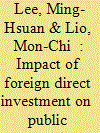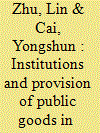| Srl | Item |
| 1 |
ID:
145790


|
|
|
|
|
| Summary/Abstract |
Peasants’ use of existing legal and political resources to right wrongs done to them and the law as a narrative frame to assert their claims in protests have been well captured in the concept of “rightful resistance.” The image of a “restive citizenry” by which peasants—as rightful resisters—struggle valiantly to defend their own rights, however, has been increasingly questioned by scholars who find either that the wronged peasants do not get angrier or that their rightful resistance is eventually muted. The present article examines dozens of inland-provincial peasant-coal miners who suffer from mining-induced pneumoconiosis. It is also found that the victims express an unwillingness to pursue their rights through the courts or enact rightful resistance if the courts or other formal institutions fall short in delivering the promised rights. In examining how peasant-coal miners consider what is the “best way” to obtain compensation, this article suggests that they could be said to be a “compromising citizenry” through which they recognize the law and formal procedures as legitimate but at the same time consider bribing state officials as a prerequisite to protect their legal rights.
|
|
|
|
|
|
|
|
|
|
|
|
|
|
|
|
| 2 |
ID:
145793


|
|
|
|
|
| Summary/Abstract |
China’s recent development of a modern legal system coupled with unparalleled economic growth have drawn substantial attention from commercial law scholars. This review summarizes Chinese- and English-language commercial law academic literature from the past decade contributed by both Chinese and non-Chinese scholars while discussing their different focuses, approaches, and methodologies. China’s use of vague laws that rely upon implementation rules resulted in a substantial proportion of articles focusing on policy discussions and comparison to foreign approaches. Subsequently, a common theme in both Chinese and English literature was transplantation of foreign law. Chinese scholars often took a nationalistic approach, primarily assessing laws on their impact on China, whereas non-Chinese scholars advocated the adoption of foreign laws or legal structures to create clear standards and provide certainty for investors, which in turn is believed to facilitate continued growth of the Chinese economy. The literature is grouped into subject categories, allowing for discussion of important works and representative articles from leaders in their respective fields.
|
|
|
|
|
|
|
|
|
|
|
|
|
|
|
|
| 3 |
ID:
145788


|
|
|
|
|
| Summary/Abstract |
During the past two decades, one of the most significant phenomena in
the Chinese social sector has been the proliferation of nonprofit organizations
(NPOs) and private foundations. The two dominant approaches
to interpret state-society relations (state corporatism and liberal civil
society) are insufficient to explain their relations with the Chinese state.
This article revives and tests an understudied model, social corporatism,
by presenting two detailed case studies on Non-Profit Incubator (NPI)
and China Foundation Center (CFC).
|
|
|
|
|
|
|
|
|
|
|
|
|
|
|
|
| 4 |
ID:
145791


|
|
|
|
|
| Summary/Abstract |
The impact of foreign direct investment (FDI) on the performance of the Chinese government has recently drawn scholastic attention. Though the literature provides insightful observations on the potential influence that FDI has on the Chinese government, little empirical evidence has been provided. This article constructs a dynamic panel data set using province-level data for China from 2000 to 2009 to estimate the impact of FDI on governance performance and the level of corruption of provincial governments in China. The estimation strategy includes a dynamic panel data (DPD) model and a fixed effect (FE) model. The results suggest that foreign capital and investors improved governance performance and reduced corruption of provincial governments. Furthermore, FDI not originating from Hong Kong, Macao, and Taiwan had a greater impact on provincial governments, representing a greater shock to the Chinese governments. The findings are robust under both specifications.
|
|
|
|
|
|
|
|
|
|
|
|
|
|
|
|
| 5 |
ID:
145789


|
|
|
|
|
| Summary/Abstract |
In societies where formal institutions are absent or weak, informal institutions
are found to serve as mechanisms that enhance government
accountability. Pertinent research on China has come up with similar
findings. But two issues have not been adequately addressed in existing
research. One is the relationship between formal and informal institutions
in shaping government behavior if both types of institutions exist.
The other is the factors that affect the (re)emergence of informal institutions.
Based on a survey of about 800 villages in Guangdong province,
this article shows that the existence of both formal and informal institutions
may enhance government accountability in the provision of public
goods. Factors such as community history and practical needs
contribute to the (re)emergence of informal institutions.
|
|
|
|
|
|
|
|
|
|
|
|
|
|
|
|
| 6 |
ID:
145792


|
|
|
|
|
| Summary/Abstract |
Using Hong Kong as a case study, this article presents findings regarding the transnational migration of highly educated young Taiwanese to global cities in recent years. Three issues are discussed: (1) migration process and patterns, (2) cultural adaptation and challenges, and (3) returning. The data were obtained via face-to-face interviews with 35 young Taiwanese in Hong Kong and Taiwan from 2012 to 2015, utilizing a semi-structured questionnaire.
|
|
|
|
|
|
|
|
|
|
|
|
|
|
|
|
| 7 |
ID:
145787


|
|
|
|
|
| Summary/Abstract |
Previous research about decentralization reform in China has primarily
focused on the vertical relations between the central government and
provincial governments; however, the decentralization reform within one province has not been sufficiently studied. Although the provinceleading-city reform has been discussed, there is still limited research about the decentralization reform for townships.
|
|
|
|
|
|
|
|
|
|
|
|
|
|
|
|